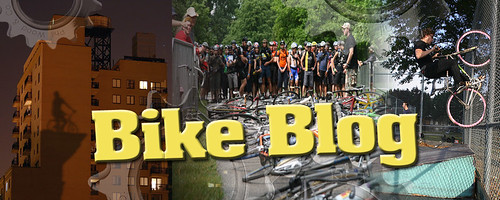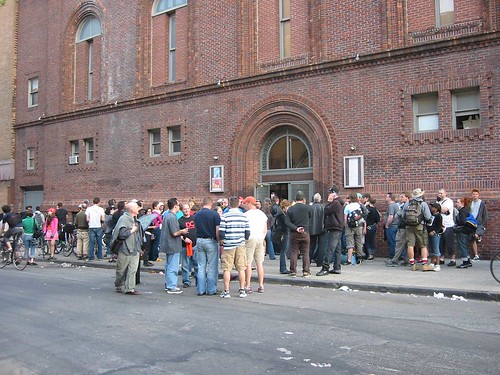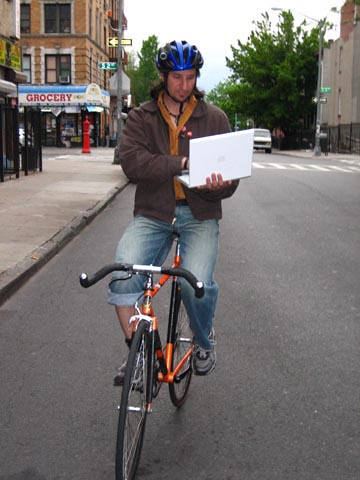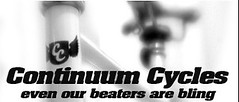Article in News Day about Critical Mass
Last day for the 5th Annual Bicycle Film Festival. Yesterday was a bike parade downtown to the film anthology where a bicycle block party was held.
Also there was a messenger style alley cat across the bridges hosted by Trackstar.
Also last night was the first warm night street partyâ¦hopefully more on that later.
I found this other blog from a guy in buffalo:
Check it out: www.bikeblog.us
An amazing article came out in News Day about Critical massâ¦
Critical Mass duel intensifies
BY GRAHAM RAYMAN AND DARYL KHAN
STAFF WRITERS
New York Newsday | 15-May-2005
Assistant Chief Bruce Smolka arrested a middle school counselor
on the north edge of Union Square Park.
Lisa Kozlowski, 30, of Manhattan, was at a rally point for
Critical Mass, a decade-old monthly bicycle ride, which has been
the target of a police crackdown since last summer. By the
police account, Smolka ordered Kozlowski's arrest because she
refused to get off her bike and move it off the sidewalk.
Kozlowski's lawyer, Sabrina Shroff, says the police overreacted.
"She was grabbed by her shirt collar, and three officers picked
her off her bike," Schroff said.
The same evening, over on Fifth Avenue and 17th Street, police
stopped four fashionably dressed women -- at least one visiting
from London -- who had been pedaling their bikes down 17th
Street.
A police supervisor asked one of the women for her ID, inquired
about her destination and released her and her friends after a
few minutes.
"There's a bicycle protest going on inside the park, but we're
sure you're not involved," he told them, according to a
videotape of the encounter.
In other words, just another evening in the escalating struggle
over the monthly ride. The battle between cops -- who say the
cyclists need a permit and are violating traffic rules -- and
cyclists -- who say it's a spontaneous event that breaks no
laws -- began when more than 200 cyclists were arrested during
the Republican National Convention in August. In the four rides
since Jan. 1, there have more been more than 80 arrests. And as
summer approaches, it seems clear that the duel will continue.
The arrests have sparked civil rights lawsuits from lawyers
representing the cyclists. The city has sued a group called
Times Up to stop them from "promoting" the ride. A week rarely
passes without some kind of activity in either criminal or civil
court. And in a kind of brinksmanship, both sides accuse the
other of making matters worse with increasingly aggressive
tactics.
While the riders say they yearn for the days of largely
uneventful rides that took place before the convention, Police
Commissioner Ray Kelly has pressed a campaign to force them to
submit to formal restrictions.
"The Police Department stands ready to work with Critical Mass
and Times Up to provide for a route that would allow mass rides
and the orderly control of traffic at intersections," said
Deputy Commissioner Paul Browne, a police spokesman.
Kelly and Browne have said that around the time of the
convention, the character of the rides changed, with cyclists
running lights and riding on the FDR Drive.
"They appeared to be hijacked by those determined to disrupt and
block traffic, as opposed to the non-disruptive group rides that
we previously experienced," Browne said.
Riders insist Critical Mass is spontaneous. Gideon Oliver, a
lawyer who represents many of the riders arrested this year,
says the police changed the tone themselves with their
aggressive tactics -- chases, at times -- and an apparent policy
of making arrests before misconduct occurs.
"You can't give a lawful dispersal order if no one has done
anything to cause it," Oliver said. Beyond that, there are major
philosophical differences.
"The roadways are designed primarily for the motor bicycles are
vehicle, too. [motor\] vehicles to travel in," Smolka testified
in court in December. "Bicyclists are allowed to use the roadway
also, but not to the exclusion of everybody else."
[This is how the paragraph appears online. Huh?]
Bicycle advocate Steve Stollman says: "If you are following the
traffic laws, then you are simply traffic. What they are saying
is any spontaneous meeting of people requires a police permit
and a flight plan. That's insane."
Some of the bikers have developed tactics of their own, such as
starting rides at multiple locations and using cell phones and
text messaging to coordinate the rides.
But the police operations each month are nothing if not
extremely elaborate: a coordinated array of uniformed and
plainclothes officers, undercover officers, orange netting,
marked and undercover cars and vans, loudspeakers, helicopters,
scooter squads and videotaping of civilians.
The officers are drawn from commands across the city. For
example, while it was Smolka who ordered Kozlowski's arrest, the
arresting officers of record were a captain from Patrol Borough
Queens South and an officer from the Bronx South Task Force,
records show.
Browne did not provide Newsday with the cost of these
operations, but Smolka has testified that "hundreds" of officers
are involved.
"We devote a large amount of resources, personnel and equipment
to do this," Smolka testified, calling it necessary to preserve
public safety.
This position has drawn skepticism from the other side.
"This is nothing more than a power struggle in which the police
have decided that they must prevail," said Steven Hyman, a
lawyer representing Times Up in the city's lawsuit. "Prior to
last August, it is clear that there was no problem. The police
were escorting the ride."
The deployment requires police supervisors to give lengthy
arrest policy briefings to the officers. On the night of
Kozlowski's arrest, a police captain told a group of about 35
officers that no officer should make more than three arrests.
Officers, he said, should actually witness wrongdoing before
making arrests.
"It's unfortunate we're all working Friday night," he told
them. "But we're here to stop them from getting out of hand and
talking over the roadways of the city."
Despite that admonition, some of those arrested maintain that
they broke no laws -- or even comitted any traffic violations.
Karen de George, 25, a fund-raising specialist from Corona, said
she was arrested at the February ride before she even got onto
her bike.
"I was with the group, and I started to walk out, when I saw the
netting and someone tapped me on the shoulder and said 'You're
under arrest,'" she said. "They left the plastic cuffs on for a
couple of hours, and I didn't get out until 3:30 in the morning.
No one told me what I was being charged with."
So far, de George has spent $750 on legal fees.
In January, Terri Carta left Union Square, stopped at the
lights, but still was arrested within three minutes after
leaving the park, her affidavit indicates.
In his court affidavit, Josh Cotton related how he and his
friends decided not to ride but were corralled anyway in the
orange netting soon after they left the park. He, too, was not
told why he had been arrested. The Cotton arrest was later
dismissed.
As the months have passed, arrestees seem to be more willing to
go to trial. Kit Bland, who freelances in television and film
production, has founded the Bicycle Defense Fund, which raises
money for legal defense and loans bicycles to those who had
theirs confiscated.
Bland has been arrested twice, both times fewer than two blocks
from Union Square.
"Look, I believe in arresting people who break the law, and
Critical Mass may be a pain in the ---- ass but it's not
illegal," Bland said. "And it's not going to go away."
During his December testimony, Smolka was asked, "If 20 to 30
bike riders obey the traffic laws, do they have a right to ride
where they want when they want?"
"You'd have to be more specific," he replied.
Smolka went on to say the legality of a group of cyclists using
the city streets would depend on "location, time of day, traffic
conditions, weather conditions, what else was going on."
Oliver, the lawyer for the cyclists, notes: "There is nothing in
the law which regulates bike use in certain weather or traffic
conditions."












3 Comments:
if more than 20 bikes ride together, they need a permit.
if more than 20 cars ride together, they are called traffic.
so why don't we offer a compromise? whenever 20 or more bikes want to ride together, they should get a permit. and if 20 or more cars want to drive in the city at the same time, they all need a permit as well.
seems like a perfect solution. and it would cut down on rush hour too.
Kelly and Browne have said that around the time of the
convention, the character of the rides changed, with cyclists running lights and riding on the FDR Drive.
seems like they forgot all those times in the last five years that we've taken the Brooklyn & Manhattan bridges, the Battery tunnel, Columbus Circle and the many Times Square cruises!
Come on Pigs guve us credit where and when its due!
Even the Judge in last years post RNC cases notices fotos from those years and called BS on this point
"We devote a large amount of resources, personnel and equipment to do this," Smolka testified, calling it necessary to preserve public safety.
Yeah cocs people on bikes are so much more dangerous than ALL the Taxis, H2's, MTA buses, and usual 2 ton death traps out onthe road, F.U. Smolka, you are the threat to public safety, and fifteen year old cyclists.
Check his mug in the NY Times article after the April Critical Mass, and tell me WHO is the real threat!
Post a Comment
<< Home